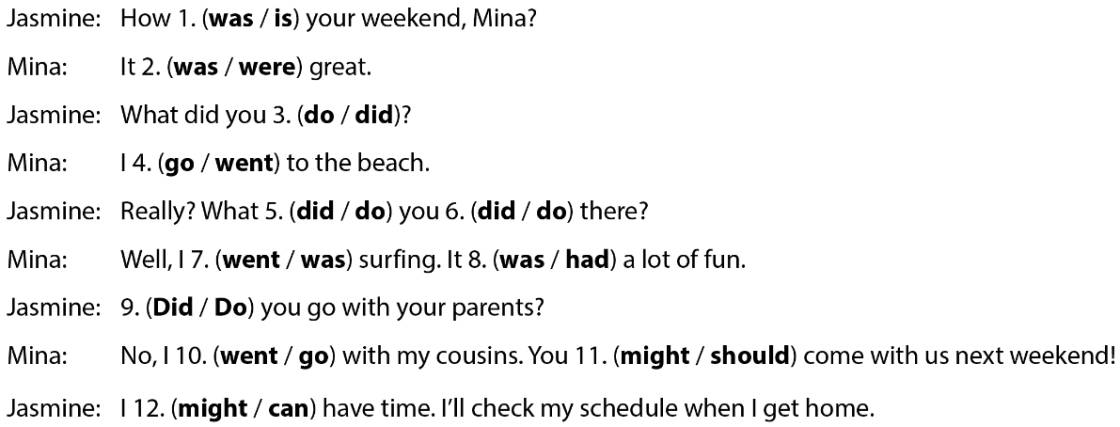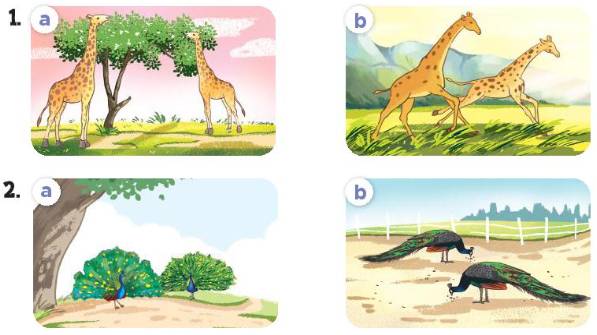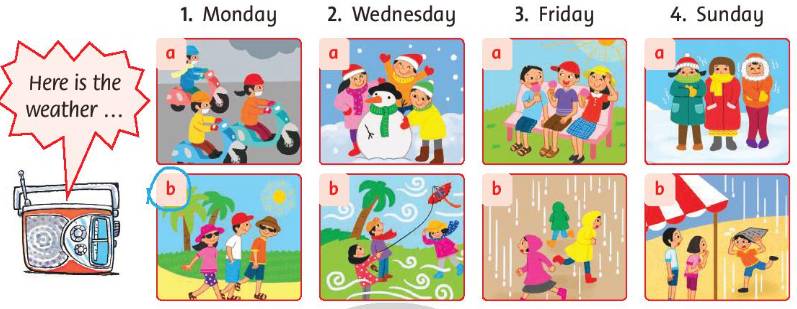Listen and circle answers.

Listen again and circle the correct answers (a-d).
1 David Brown decided to write a book about public school traditions because
a they reminded him of his own school days.
b he's always had an interest in public schools.
c he works in a public school.
d somebody else asked him to write it.
2 'The Wall Game' is a game which
a is only played at a small number of public schools.
b has been played since 1909.
c involves kicking a ball over a wall to score.
d has very few goals.
3 The sport of rugby was invented
a by a schoolboy called Rugby in 1823.
b by a schoolboy called Ellis at a school called Rugby College.
c in various different countries around the same time.
d at Eton College.
4 What does the game called 'the Greaze' involve?
a Students throw books at a cook.
b Students make a pancake.
c Students try to get a piece of a pancake.
d Students throw a pancake as high as possible.
1. b | 2. d | 3. b | 4. c |
1 David Brown decided to write a book about public school traditions because
(David Brown quyết định viết một cuốn sách về truyền thống trường tư vì)
=> b he's always had an interest in public schools.
(anh ấy luôn quan tâm đến các trường tư thục.)
Thông tin:
G Well, I didn’t actually go to a public school myself – I went to an ordinary state school – but I’ve always been fascinated by the idea of them, and by their traditions. (Chà, bản thân tôi không thực sự học trường tư – tôi học ở một trường công lập bình thường – nhưng tôi luôn bị cuốn hút bởi ý tưởng về chúng và bởi truyền thống của chúng.)
2 'The Wall Game' is a game which
('The Wall Game' là một trò chơi mà)
=> d has very few goals.
(có rất ít bàn thắng.)
Thông tin:
P ...For example, the Eton Wall Game is a very old tradition.
(Ví dụ, trò Bức tường Eton rất lâu đời rồi đấy nhỉ.)
G ...But it’s so difficult to score that the last goal was in 1909, more than a hundred years ago!
(Nhưng nó thật sự khó để ghi bàn vì bàn thắng cuối cùng là vào năm 1909, hơn 100 năm trước rồi!)
3 The sport of rugby was invented
(Môn thể thao bóng bầu dục được phát minh)
b by a schoolboy called Ellis at a school called Rugby College.
(bởi một cậu học sinh tên là Ellis tại trường Cao đẳng Rugby.)
Thông tin:
G Well, of course the sport of rugby gets its name from the public school where it was first played: Rugby College. The story is that during a game of ordinary football in 1823, a boy named William Webb Ellis picked up the ball and ran with it – so he invented the sport of ‘rugby football’. (Chà, tất nhiên môn thể thao bóng bầu dục lấy tên từ trường tư thục nơi nó được chơi lần đầu tiên: Rugby College. Chuyện kể rằng trong một trận bóng đá thông thường vào năm 1823, một cậu bé tên là William Webb Ellis đã nhặt quả bóng và chạy đi với nó – vì vậy cậu đã phát minh ra môn thể thao “bóng bầu dục”.)
4 What does the game called 'the Greaze' involve?
(Trò chơi có tên là 'the Greaze' liên quan đến điều gì?)
c Students try to get a piece of a pancake.
(Học sinh cố gắng tranh lấy một miếng bánh kẹp.)
Thông tin:
G The cook throws the pancake in the air and the students fight over it for one minute. The student that gets the largest piece of the pancake is the winner and receives a prize – a gold coin. (Người đầu bếp tung chiếc bánh kếp lên không trung và các học sinh tranh giành nó trong một phút. Học sinh nào giành được miếng bánh kếp lớn nhất sẽ là người chiến thắng và nhận được phần thưởng - một đồng tiền vàng.)
Bài nghe:
P = Presenter
G = Guest
P In this part of the programme, I’m going to talk to David Brown, who’s written a book about English public schools. David, welcome. Why did you choose this topic?
G Well, I didn’t actually go to a public school myself – I went to an ordinary state school – but I’ve always been fascinated by the idea of them, and by their traditions. And I’m sure I’m not the only one. In fact, since I wrote my book, I’ve met lots of other people who share my interest.
P Really? Now, in your book, you describe quite a few of these traditions. For example, the Eton Wall Game is a very old tradition. It dates back to ... when exactly?
G 1766. Yes, it’s a game that is played only at Eton College. It’s a bit like football, but the pitch is very narrow and it’s next to a wall. Each team has to get the ball to the end of the wall. If they do that, they score a goal. But it’s so difficult to score that the last goal was in 1909, more than a hundred years ago!
P Are there any other unusual games played at public schools?
G Well, of course the sport of rugby gets its name from the public school where it was first played: Rugby College. The story is that during a game of ordinary football in 1823, a boy named William Webb Ellis picked up the ball and ran with it – so he invented the sport of ‘rugby football’. That sport is now played all over the world. But the Eton Wall Game isn’t! In fact I think it is still only played at Eton.
P Well, with one goal every hundred years, I’m not surprised.
G And then there’s the Greaze.
P The Greaze?
G Yes, the Greaze – G-R-E-A-Z-E. It’s a game that’s played once a year, on pancake day, at Westminster School. The school cook makes a special pancake with horse hair in it, to make it stronger.
P That sounds disgusting. Horse hair?
G Yes, but they don’t eat it. The cook throws the pancake in the air and the students fight over it for one minute. The student that gets the largest piece of the pancake is the winner and receives a prize – a gold coin. Then the whole school has a half-day holiday.
P Amazing.
G Yes. And in the past, there was another part of the tradition. If the cook didn’t throw the pancake high enough, all the students threw their Latin books at him. But that doesn’t happen now.
P That’s good. Poor cook! Well, it sounds like a fascinating book. David Brown, thank you very much.
Tạm dịch:
P = Diễn giải
G = Khách mời
P Trong phần này của chương trình, tôi sẽ nói chuyện với David Brown, người đã viết một cuốn sách về các trường công lập ở Anh. Chào mừng David. Tại sao bạn chọn chủ đề này?
G Chà, bản thân tôi không thực sự học trường tư – tôi học ở một trường công lập bình thường – nhưng tôi luôn bị cuốn hút bởi ý tưởng về chúng và bởi truyền thống của chúng. Và tôi chắc chắn rằng tôi không phải là người duy nhất. Trên thực tế, kể từ khi tôi viết cuốn sách của mình, tôi đã gặp rất nhiều người khác có cùng sở thích với tôi.
P Thật sao? Hiện tại thì trong cuốn sách của bạn, bạn mô tả khá nhiều những truyền thống này. Ví dụ, Trò chơi Bức tường Eton là một truyền thống rất lâu đời. Nó có từ... chính xác là khi nào?
G 1766. Đúng vậy, đó là một trò chơi chỉ được chơi ở Đại học Eton. Nó hơi giống bóng đá, nhưng mặt sân rất hẹp và nằm sát tường. Mỗi đội phải đưa bóng đến cuối bức tường. Nếu họ làm được điều đó, họ sẽ ghi bàn. Nhưng thật khó để ghi bàn khi bàn thắng cuối cùng là vào năm 1909, hơn một trăm năm trước!
P Có trò chơi khác thường nào khác được chơi ở các trường tư không?
G Chà, tất nhiên môn thể thao bóng bầu dục lấy tên từ trường tư thục nơi nó được chơi lần đầu tiên: Rugby College. Chuyện kể rằng trong một trận bóng đá thông thường vào năm 1823, một cậu bé tên là William Webb Ellis đã nhặt quả bóng và chạy đi với nó – vì vậy cậu đã phát minh ra môn thể thao “bóng bầu dục”. Môn thể thao đó bây giờ được chơi trên toàn thế giới. Nhưng Trò chơi Bức tường Eton thì không! Trên thực tế, tôi nghĩ nó vẫn chỉ được chơi ở Eton thôi
P Chà, chỉ với 1 bàn thăng sau một trăm năm, thì tôi cũng không ngạc nhiên lắm.
G Và sau đó là Greaze.
P Greeze?
G Vâng, Greaze – G-R-E-A-Z-E. Đó là một trò chơi được chơi mỗi năm một lần, vào ngày bánh kếp, tại Trường Westminster. Đầu bếp của trường làm một chiếc bánh kếp đặc biệt với lông ngựa để khiến nó đậm đà hơn.
P Nghe có vẻ hơi ghê ghê. Lông ngựa sao?
G Đúng vậy, nhưng họ không ăn nó đâu. Người đầu bếp tung chiếc bánh kếp lên không trung và các học sinh tranh giành nó trong một phút. Học sinh nào giành được miếng bánh kếp lớn nhất sẽ là người chiến thắng và nhận được phần thưởng - một đồng tiền vàng. Sau đó toàn trường được nghỉ nửa ngày.
P Thích vậy.
G Đúng thế. Và trong quá khứ, có một phần khác của truyền thống. Nếu người đầu bếp không ném chiếc bánh đủ cao, tất cả học sinh sẽ ném sách tiếng Latinh về phía anh ta. Nhưng bây giờ người ta không làm vậy nữa.
P Thế là tốt. Tội người người đầu bếp! Vâng, và có vẻ như đó là một cuốn sách hấp dẫn đấy. Cảm ơn bạn rất nhiều, David Brown.
Listen. Circle the correct answers.

Listen to four people talking about their backgrounds and their families. circle the correct answers (a-c)
1. Bilal’s dad
a. was born in the UK.
b. is going to have a change of career.
c. wants to study law.
2. Sandra’s family
a. have owned a number of farms.
b. sold the first farm and bought a bigger one.
c. have owned the same farm for many years.
3. Charlotte’s mum
a. brought up her daughter in France.
b. isn’t married.
c. has been married twice.
4. Calum’s parents
a. inherited and ran a successful family business.
b. didn't have a good education.
c. left Britain many years ago.
b. Now, listen and circle the correct answers.
(Bây giờ, hãy nghe và khoanh tròn các câu trả lời đúng.)
1. When did the idea of the internet come about? (Ý tưởng về internet ra đời khi nào?)
a. in the 1960s (vào những năm 1960) b. in the 1990s (trong những năm 1990)
2. In which country was the first long-distance network created? (Mạng đường dài đầu tiên được tạo ra ở nước nào?)
a. the UK (Vương quốc Anh) b. the USA (Mỹ)
3. What was the first message sent over the network? (Tin nhắn đầu tiên được gửi qua mạng là gì?)
a. “hello” (xin chào) b. “login” (đăng nhập)
4. What is an internet protocol? (Giao thức internet là gì?)
a. a set of rules (một tập hợp các quy tắc)
b. a message between two computers (một tin nhắn giữa hai máy tính)
5. What did Tim Berners-Lee invent? (Tim Berners-Lee đã phát minh ra gì?)
a. the World Wide Web (World Wide Web)
b. a messaging software (một phần mềm nhắn tin)
1. a
When did the idea of the internet come about? - a. in the 1960s
(Ý tưởng về internet ra đời khi nào? - vào những năm 1960)
Thông tin: Originally, the idea of creating the internet came about in the 1960s.
2. b
In which country was the first long-distance network created? - the USA
(Mạng đường dài đầu tiên được tạo ra ở nước nào? - Mỹ)
Thông tin: In 1969, two research teams at the University of California and Stanford Research Institute in the USA created a long-distance network between two computers.
3. b
What was the first message sent over the network? - b. “login”
(Tin nhắn đầu tiên được gửi qua mạng là gì? - đăng nhập)
Thông tin: A message saying "login" was sent from one computer to the other.
4. a
What is an internet protocol? - a. a set of rules
(Giao thức internet là gì? - một tập hợp các quy tắc)
Thông tin: In 1974, American scientists, Vinton Cerf and Bob Kahn, developed the first internet protocol, which is a set of rules that allow computers to communicate with each other.
5. a
What did Tim Berners-Lee invent? - a. the World Wide Web
(Tim Berners-Lee đã phát minh ra gì? - World Wide Web)
Thông tin: In 1989, British scientist Tim Berners-Lee invented the World Wide Web or WWW.
Circle the correct answers. Then listen and check.

1: was doing
2: saw
3: met
4:was walking
5: were climbing
Hướng dẫn dịch
1. Anh ấy đang làm bài tập khi mà bạn gọi
2. Họ đang lái xe từ trường về khi họ thấy vụ tai nạn
3. Tôi đang đạp xe khi tôi nhìn thấy một người bạn.
4. Tớ đang đi bộ trong công viên khi tớ thấy một chú chó đi lạc
5. Chúng tớ đang leo núi khi mà anh trai tớ bị đau chân.
Complete the conversation. Circle the correct words. Then listen and check your answers.

1. was 2.was 3. do 4. went 5. did 6. do
7. went 8. had 9. Did 10. went 11. should 12. Might
Hướng dẫn dịch
Jasmine: Cuối tuần của cậu như thế nào vậy Mina?
Mina: Nó rất là tuyệt.
Jasmine: Cậu đã làm gì vậy?
Mina: Tớ đã đi đến bãi biển.
Jasmine: Thật á? Cậu đã làm gì ở đấy?
Mina: Ừ, tớ đi lướt ván. Nó thật sự rất là vui.
Jasmine: Cậu có đi cùng với bố mẹ không?
Mina: Không, tớ đi với họ hàng của mình. Bạn nên đi với bọn tớ vào tuần sau.
Jasmine: Tớ có thể có thời gian. Tớ sẽ về kiểm tra lịch khi tớ về nhà.
Listen and circle.

Bài nghe:
1.
A: Look at these animals, Mum. What are they? (Nhìn những vật kia kìa, mẹ ơi. Chúng là những con gì vậy ạ?)
B: They're giraffes, dear. (Chúng là những con hươu cao cổ đấy con yêu à.)
A: I like them. (Con thích chúng.)
B: Why do you like giraffes? (Tại sao con lại thích hươu cao cổ?)
A: Because they run quickly. (Bởi vì chúng chạy rất nhanh.)
2.
A: Oh, look at these peacocks. (Ồ, hãy nhìn những con công kìa.)
B: Where? (Ở đâu vậy?)
A: Over there, under the tree. I like them. (Ở đằng kia, dưới cái cây đó. Tớ thích chúng.)
B: Why do you like peacocks? (Tại sao cậu lại thích những con công?)
A: Because they dance beautifully. (Bởi vì chúng nhảy thật là đẹp.)
Lời giải chi tiết:
1. b 2. a
Listen and circle the answer.

1. Kate has English homework.
(Kate có bài tập về nhà môn tiếng Anh.)
2. Mom is helping her.
(Mẹ đang giúp bạn ấy.)
3. Mom has a picture of rice.
(Mẹ có một bức ảnh về gạo.)
Listen and circle a or b.

1. b | 2. b | 3. b | 4. a |
Nội dung bài nghe:
Here is the weather.
1. It’s Monday. It’s a sunny morning.
2. It’s Wednesday. The weather is very windy. Be careful!
3. It’s Friday. It’s rainy. Don’t forget your umbrellas. Don’t get wet.
4. Sunday morning. Here is the weather. It’s cold outside. Keep warm.
Hướng dẫn dịch:
Sau đây là bản tin thời tiết.
1. Hôm nay là thứ Hai. Buổi sáng trời nắng.
2. Hôm nay là thứ Tư. Thời tiết rất gió. Hãy cẩn thận!
3. Hôm nay là thứ Sáu. Trời có mưa. Đừng quên mang theo ô. Đừng để bị ướt.
4. Sáng Chủ nhật. Đây là bản tin thời tiết. Bên ngoài trời lạnh. Hãy giữ ấm.